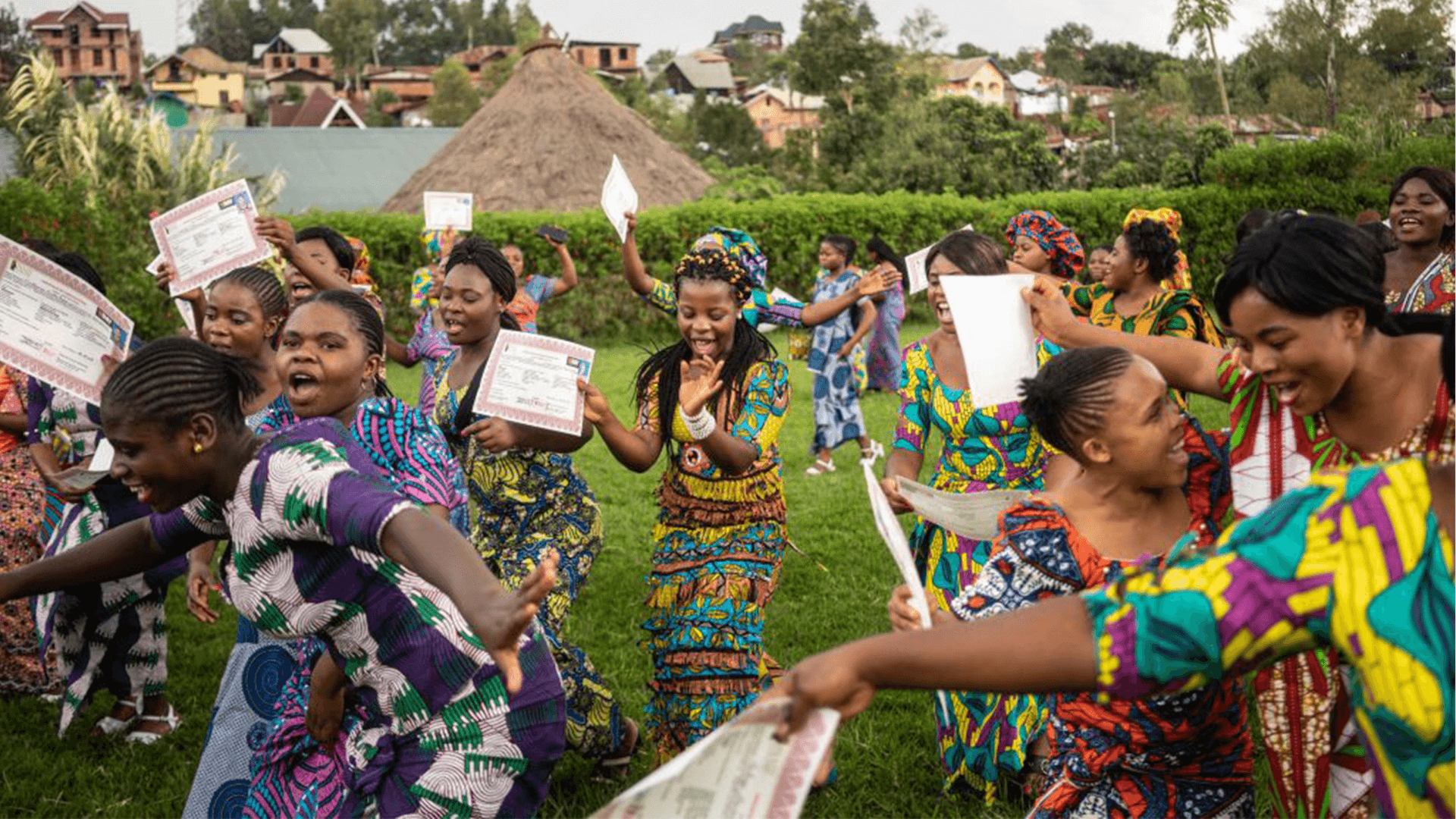How City Of Joy Is Providing Hope & Life After Sexual Violence For Women In Eastern DRC
TW: This article contains mentions of sexual violence and baby loss.
In a classroom at City of Joy, a centre that helps survivors of sexual violence in the east of the Democratic Republic of Congo, women giggle as they compare sketches of their vaginas. Their homework – to draw themselves – is aimed at shattering stigmas around sex organs. “If it is forbidden to even talk about it, how can you say if something has happened to it?” says Christine Schuler Deschryver, one of the organisation’s founders. “You end up keeping your secret.”
City of Joy was born after Eve Ensler, an American activist who penned the play, The Vagina Monologues, visited the Democratic Republic of Congo (DRC) in 2007. She went to a hospital founded by gynaecologist Dr Denis Mukwege, who treats women who have been subject to sexual violence.
Deschryver was already helping women in the region, sometimes paying for them to travel to the hospital from rebel-besieged areas, where rape was being used as a weapon of war. She accompanied Ensler around the hospital in the city of Bukavu, acting as a translator so she could speak to women recovering from rape-inflicted injuries.
Sitting by their beds, Ensler gently asked if there was any way in which she could help. Many patients said the same thing: they wanted a safe space where they could heal from their ordeals. “That is how City of Joy was created. The idea came from Congolese women,” says Deschryver.
Every afternoon at City of Joy, women in colourful skirts and head wraps sing together, clapping their hands and moving from side to side in time to the song. It is hard to believe that so many of the centre’s exuberant residents have suffered traumas such as being gang raped at the hands of rebel soldiers.
“They are so beautiful and so fierce,” says Deschryver. “Dance is central to healing as it allows women to feel the expanse of their power and energy, to begin to love their bodies, to move in community.”
Conflict has ravaged Eastern DRC, on and off, since 1996. Militiamen sometimes rape women in enemy villages as a way to demoralise communities. Over a hundred rebel groups still operate in the region, hiding in its dense rainforests. They fund themselves by mining gold, tin and coltan (a metal used in mobile phones).
City of Joy, which is funded by Ensler, has become the safe space that patients at the hospital were seeking. It welcomes 180 women a year, each of whom spends six months living at the centre and taking classes on reproductive rights, self-defence and civic justice.
In group therapy sessions, women talk about what happened to them and write themselves imaginary apology letters from their rapists. (This activity is inspired by Ensler’s book, The Apology, in which she writes to herself from the perspective of the father that abused her throughout her childhood.)
Some women, including Jane Mukunilwa, first arrived at the centre as students but have stayed on as staff, serving as living examples that there is life after rape.
When Mukunilwa arrived at Dr Mukwege’s hospital in 2007, she was barely conscious and close to dying. She had been abducted from her village and taken to the forest by a rebel group. Militiamen tied her to a tree and raped her repeatedly for two months. She was eventually rescued by the Congolese army and returned home, only to be abducted again by the same group, months later.
This time, she was heavily pregnant with one of their children. The men thumped her stomach so hard with a machete that she lost the baby. Parts of the child rotted inside her and later had to be removed at the hospital.
“Nowadays, she is so alive, she works with her pain. Jane is City of Joy!” says Deschryver, insisting that I talk to her to understand more about the centre’s ethos.
I call Mukunilwa the next day. She is open, talkative and eloquent. “It is an honour to work here,” she tells me. “All the women at City of Joy have suffered tragedies. I have healed and become a leader; this gives others hope.”
The situation in the DRC is not improving. Seven million people are displaced after a recent uptick in violence. Women are being raped in camps, as well as by rebels. Mukunilwa says that there is a small cause for hope, though, as at least more people are reporting rapes and seeking help – a step towards ending the impunity.
City of Joy has something to do with this. When women leave the centre they return to their communities, if it is safe enough, and become focal points for others who have experienced sexual violence. They talk openly about rape, trying to erode the stigmas around it.
At the end of my chat with Mukunilwa, I ask if there’s anything else she wants to discuss.
“You are a journalist, so tell the world what is happening at City of Joy,” she says. “Tell them about Christine’s work and the work of Dr Mukwege.” After a pause, she adds: “And tell them about the violence and rape that continues to exist in Congo, the world needs to know that this is still a reality.” I promise her to try my best.
Discover more about the work City of Joy is doing, and donate to support the organisation here.
Olivia Acland is a freelance writer and photographer, formerly based in the DRC for The Economist. She now covers stories across the Middle East and Africa for a number of publications including Al Jazeera, The Telegraph, Reuters, The Guardian and BBC




